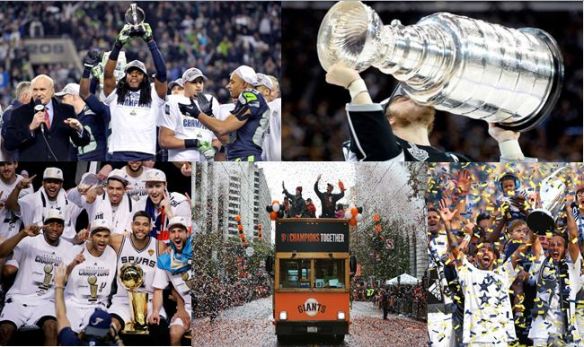As 2014 comes to a close, here’s a look back at the champions of the major American sporting leagues and what communication lessons could be learned from each of these title-clinching teams.
(NFL) Seattle Seahawks – Proving that defense really does win championships, the ‘hawks beat up the Denver Broncos, 43-8, while paying the Super Bowl in New York…in January…outside. Riding a wave of momentum all season, the team was backed by its “12th Man” of fans while using the slogan “Why Not Us?” on their way to the big game blowout.
- Lesson – Mutual Engagement Drives a Successful Shared Experience: Engaging your brand “fans” and involving them in your success helps to drive not only their engagement, but a feeling of inclusion. Plus, the team’s internal slogan gave everyone in the organization a common rallying cry, uniting them in their goal.
(NHL) L.A. Kings – Honestly, I don’t watch much hockey…maybe it’s my adverse reaction to a championship on ice being played in the middle of summer. But, the Kings did win their second title in three years in 2014, in a commanding 4-games-to-1 performance. They also did so while playing in 26 playoff games, the longest of any Stanley Cup-winning team in history.
- Lesson – Enduring the Long Road Can Lead to Dominance: Playing 26 playoff games in any sport seems like a daunting task. However, focusing on each series and not looking too far down the road, helped the Kings keep their focus during their impressive journey. While it may seem impossible on the outset, persevering during the long, challenging times can lead to a momentous accomplishment.
(NBA) San Antonio Spurs – The franchise won its fifth title in five games over the Miami Heat and put itself into the debate of being the most recent NBA dynasty.
- Lesson – The Big Team is Better than the Big Three: San Antonio is known for not being flashy, but always having the right team members step up when it counts. In 2014, it was young forward Kawhi Leonard that helped propel the Spurs to beat the Heat. Eventually Miami’s big three of Bosh, Wade, and James broke up, proving it’s not always good to be “king.” More importantly, it illustrated that multiple teammates fulfilling their specific roles can be better than a few members trying to do everything.
(MLB) San Francisco Giants – Earning their third title in just five years, the Giants won the World Series in seven games over my hometown and beloved Kansas City Royals. So just how did this team by the Bay stop a Royals team from the city of fountains?
- Lesson – Sometimes All You Need is One: Despite the Royals’ incredible run in the postseason (they won the most playoff games possible without winning the title), the Giants possessed a pitcher in Madison Bumgarner that simply shut them down every time he took the mound. En route to becoming arguably the best World Series pitcher of all time, he proved that while one may be the loneliest number, sometimes, one great solution can overcome several good obstacles.
(MLS) L.A. Galaxy – The soccer franchise became the first in Major League Soccer win five titles (2002, 2005, 2011, 2012, 2014), with a 2-1 victory over the New England Revolution.
- Lesson – Keep Evolving to Maintain Greatness: Perhaps just as impressive as the five titles are that the franchise has appeared in half of MLS’ championship games since its inception in 1996. The nine appearances over the league’s 18 years have occurred with different players and coaches, each tweaking lineups, rotations, and strategy, but all equaling amazing results. Even if it’s not broken, you may still want to try and fix it.
So overall, what was the general theme from all of these winning teams? That is, besides the Pacific time zone apparently being the one to play in?
Simple: The teams used what worked for them. While imitation may be the sincerest form of flattery, when a team – of players or employees – relies on its own innovation, that’s when championship performances are made.
Thank you for following Lessons from Left Field as it began in 2014. I look forward to sharing more communication takes with you from what the sporting world brings us in 2015.

